Summer NAMM, which took place at Nashville’s Music City Center from July 18-20, reported 16,001 attendees, an increase of 7 percent compared to 2018. International attendance increased by 32 percent. The show counted more than 1,500 brands presented by 500 total exhibitors.
“Summer NAMM seemed to highlight the important role of both the manufacturer and the dealer in maintaining a strong musical ecosystem,” said Joe Lamond, NAMM president and CEO. “While the marketplace is evolving rapidly, our manufacturer and retail members are adapting and finding strength in better understanding each other and finding new and innovative ways to work together to better serve the music-making community.”
The key buzzword at the trade show was disruption, which was defined as “change without time to resist it.” In fact, the opening breakfast session, titled “Retail Disruptors,” hosted by Lamond on July 18, was all about this topic. “I believe a new world is coming, but it is not here yet. It is on the way,” said Lamond. “… I believe one thing sums up everything going on in the world: disruption. When I say disruption, I am talking about the trends, policies, people and regulations that can change the way we do business. … It is our job to lead, adapt and continue to drive this industry.”
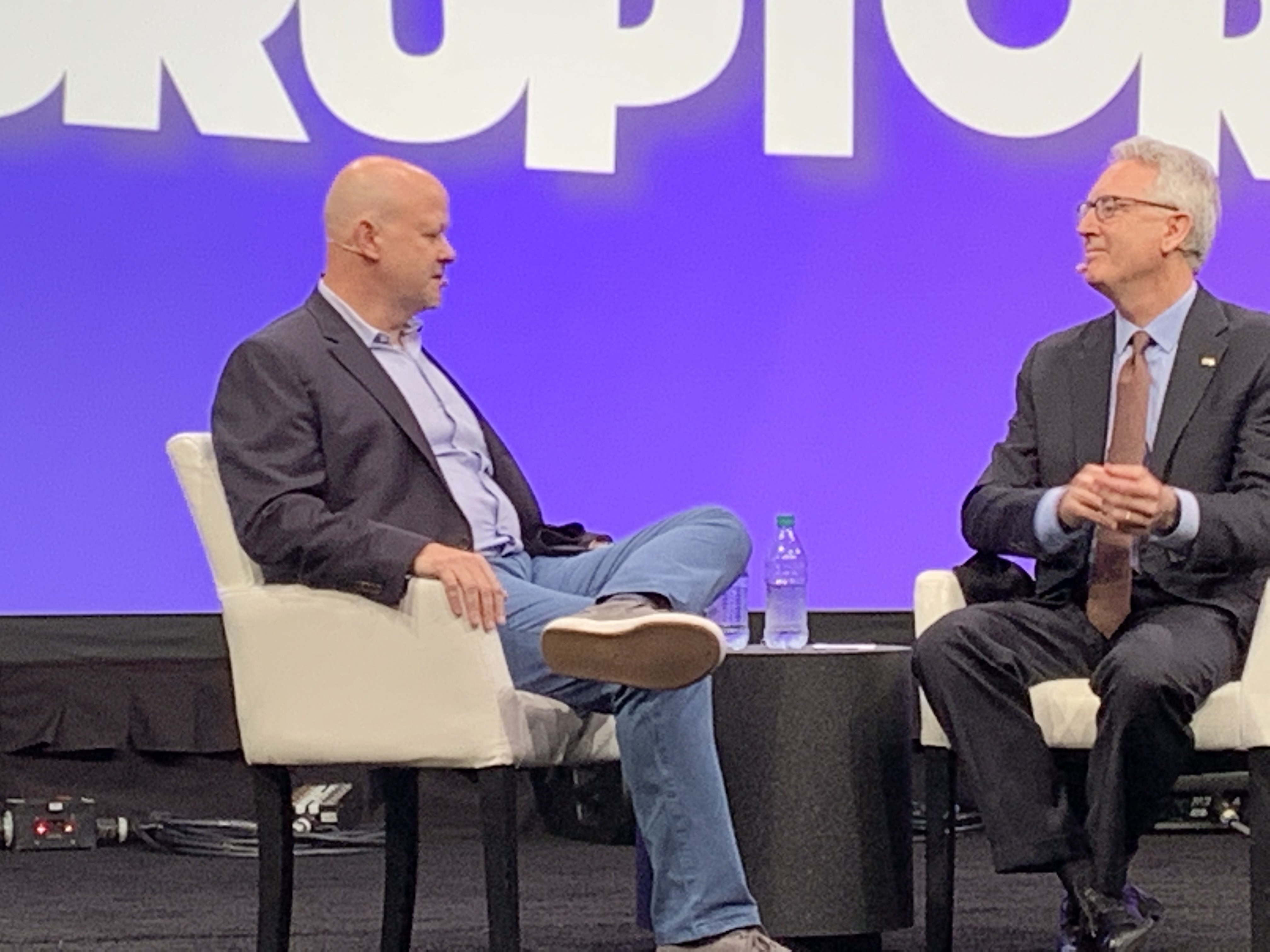
Larry Bailin with Joe Lamond
To further explain disruption, Lamond welcomed marketing expert Larry Bailin to the stage. Bailin said MI retailers should look hard at their customers in an effort to lead and adapt. “What are the things that are grasping their attention?” Bailin asked. “It’s not enough to see what your competitors are doing. You also need to see what they are not doing.”
As expected, Bailin said Amazon is tremendous at the disruption game. But perhaps lesser known is how they disrupt so well. It all starts with a core principle: objection handling, he relayed. “Amazon has given us every reason to say ‘yes’ and no reasons to say ‘no.’ They have a patent on a blimp that distributes drones. It is not out there yet, but they have the patent on it. They always are thinking about getting us to say ‘yes.’ And if we have a reason to say ‘no,’ they work on disruptive technologies to get rid of that obstacle.”
He cited Amazon eliminating checkout counters at grocery stores as an example. “They looked at the entire grocery shopping experience and determined checkout is what customers like the least. So, they eliminated that obstacle.”
Bailin added that perspective is also important. He recalled visiting Google’s headquarters on several occasions. During one of those trips, the internet giant’s chief financial officer got up on stage to deliver the opening keynote speech about the future. “She asked a room full of digital marketers from all over the globe, ‘If we were to offer you a pill you would swallow and it would on a continuous basis send biosignals back to Google, telling us what was going on inside your body, and compare it to people with similar lifestyles, would you swallow it?’ Out of 1,000 people in the room, only five raised their hands,” Bailin described. “But then, she put context behind her comments. She said if your smartwatch goes off and says you have a 94-percent chance of having a heart attack and please sit down, an ambulance is coming, and your calendar has been cleared, ‘Would you then take the pill?’ Everyone hands went up. When it comes to extending your life, you are willing to give up some privacy.”
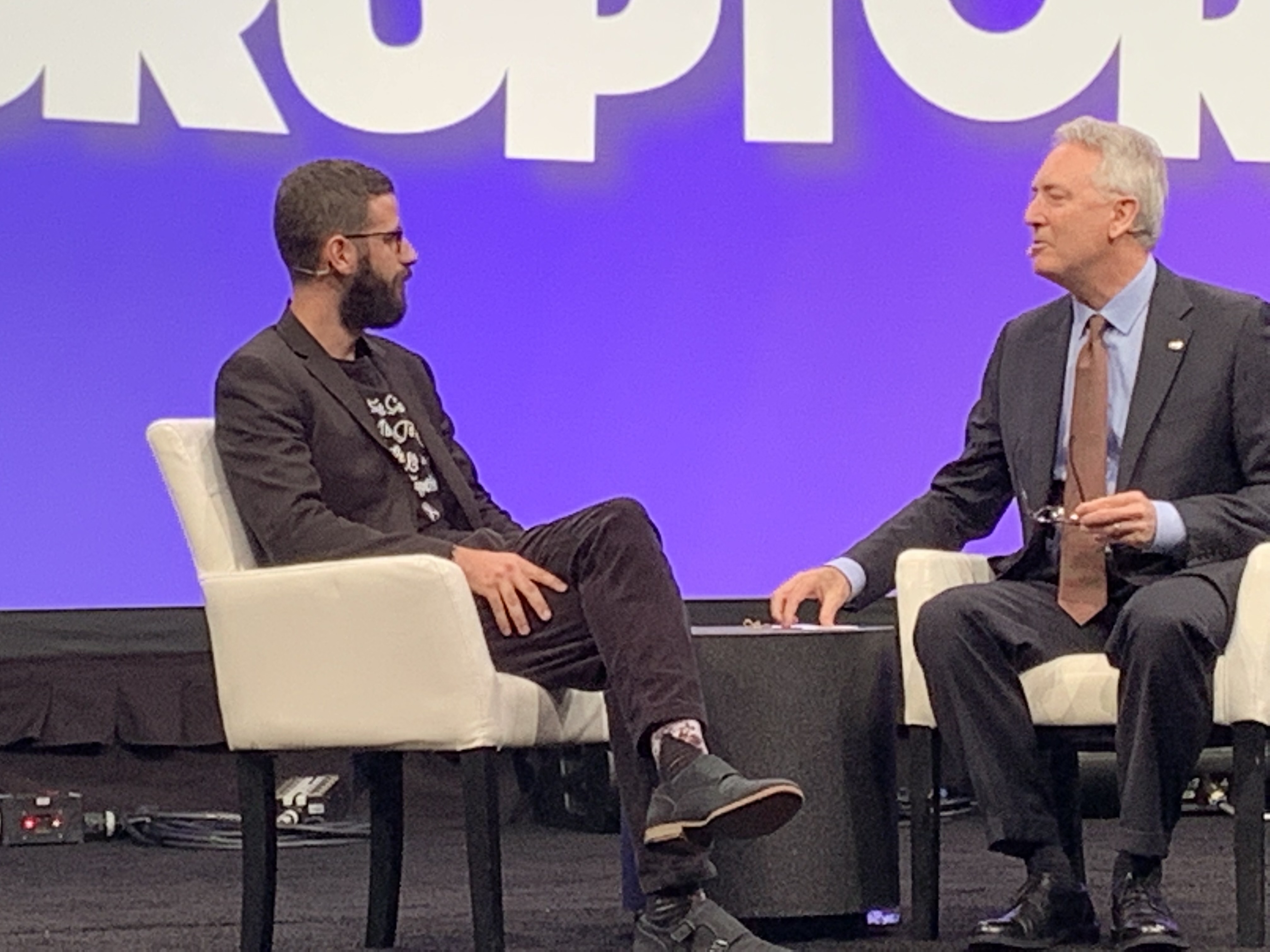
Resonate Music School & Studio’s Michael Cathrea with NAMM president and CEO Joe Lamond
Continuing on the disruption theme, Lamond noted there is one segment of MI where there has been very little disruption: lessons. But that is changing. A great example is Edmonton, Alberta, Canada’s Resonate Music School & Studio, owned by Michael Cathrea. “When we started Resonate, I was 23,” said Cathrea. “I looked back at the music lessons I had had and thought there were ways to improve the experience.”
Cathrea started his business in May 2012 with about 50 students and a goal to get customers inspired to learn. As was shown via photos during the educational session, the Edmonton location looks top notch. Cathrea initially had nine lesson rooms, a recording studio and very few retail products for sale. In just two years, Cathrea doubled the number of lesson rooms to 18. He added a second location in June to help handle increasing demand. Resonate now teaches 1,200 students.
As a way to get more customers in and handle objections, Cathrea threw out the idea that students need to take lessons from September to June, similar to a school year. “I saw that students had to have lessons for nine months, and if you miss a lesson, it’s too bad, you lost it. And at the end of the year, you will play [a concert] for your grandmother or uncle,” said Cathrea. “We just didn’t think that was very inspiring. We almost wanted to do the opposite [of what was happening]. With us, we have a month-to-month, membership-based system. You start when you want, and you finish when you want. We try to be as flexible as possible.”
Cathrea also tried to eliminate the notion that music lessons are an obligatory thing that students have to do and don’t enjoy. And he made sure that parents of students taking lessons had a place to stay and be comfortable during the lesson. “We want to have a place that, when you walk in, you are inspired to learn,” said Cathrea.
As an added bonus, students earn an hour in Resonate’s recording studio following every three months they are signed up for lessons. “[Students] get insight into that industry, and it gives them an incredible experience they will remember,” said Cathrea. A major summer concert and rewards points are other benefits students can enjoy. Students receive 50 Resonate rewards points for every lesson they take. Once enough points are accrued, iTunes gift cards, movie theater gift cards and waterpark passes are among the items that can be obtained.
“I don’t think people learn simply for the love of learning,” Cathrea asserted. “We try to give them as many incentives as we can to give them something to look forward to.”
On the other side of the coin, teachers are willing to adjust to changes in their scheduling, stated Resonate’s owner. One big positive for them is they can have year-round work, instead of just nine months a year, like traditional locations may provide.
Cathrea concluded by stating he didn’t think of himself as a disruptor back in 2012, but now he knows he is. He continued, stating that he is aware competitors will adjust to the shockwaves he sent through traditional lesson programs. “We are aware of our competitors,” he said. “But we obsess about our customers.”
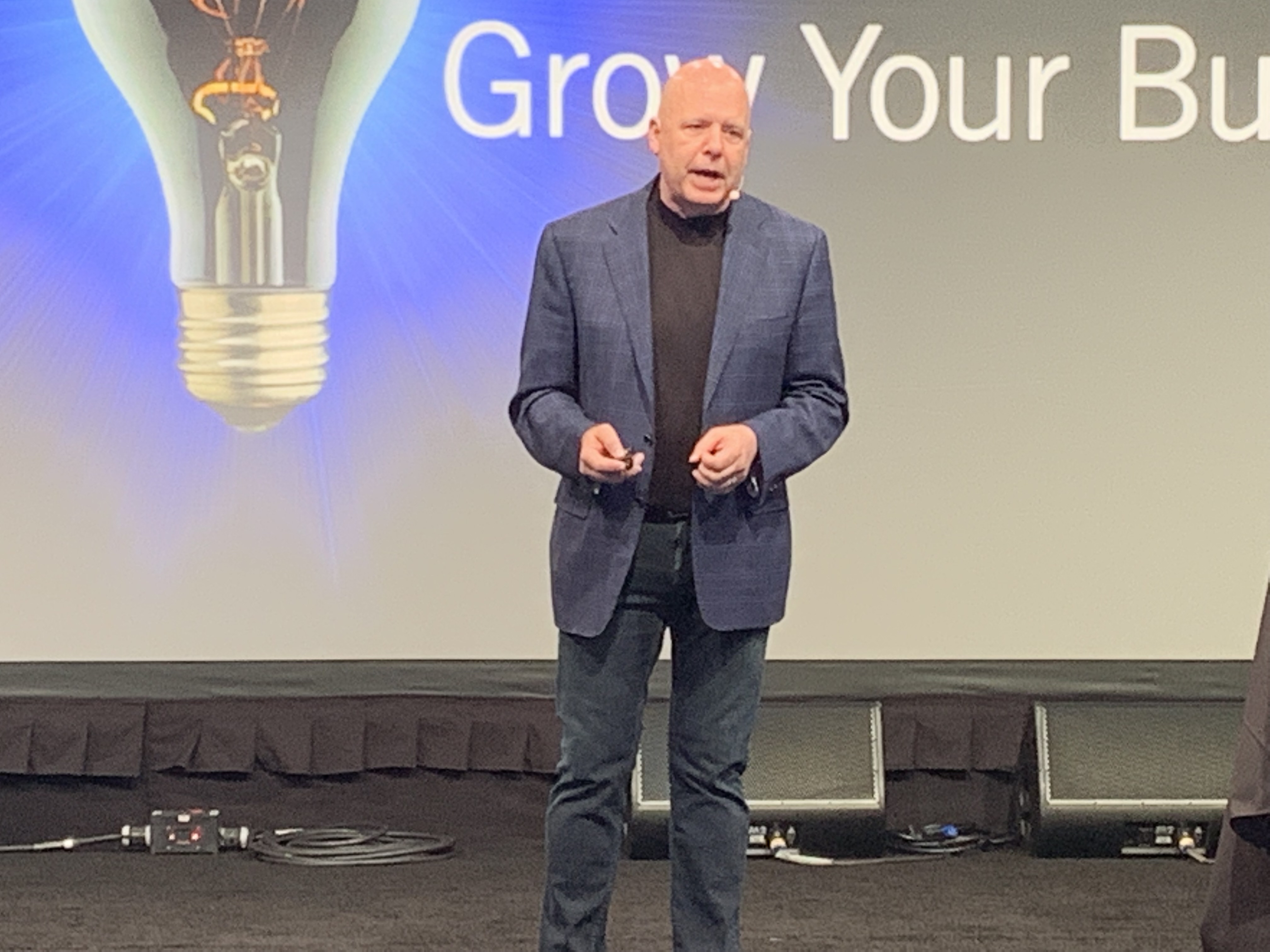
Shep Hyken
Master Shep
July 19’s breakfast session, entitled “The Customer Experience Revolution,” presented by Shep Hyken, offered plenty of anecdotes, fun and tips for retailers. “We are trying to outservice our competition, whether they are down the street, online or anywhere else. The goal is to create loyalty for your customers,” Hyken said.
Customer service definitely needs to be improved he added, citing a 2018 study that stated $75 billion was lost in the past year due to poor service. “That means somebody else out there made $75 billion because they had good customer service,” said Hyken. “The number two years prior was $62 billion. Two years before that, the number was $32 billion. More money is being lost to poor customer service. This is not good. But it’s not bad either. Service is getting better every year, but the bar is higher. Our customers are smarter than ever before.”
Hyken added, however, that according to a Vanderbilt University study, up to 40 percent of your satisfied customers may not come back to shop with you. “Why wouldn’t they want to come back? They are just satisfied. It’s a rating, not an emotion,” relayed Hyken. “We don’t want a satisfied customer. We want a loyal customer. Why would somebody want to come back to a place that is just OK to do business with when they can find somebody that might make them feel better and provide a better experience?”
You can’t be just fine in terms of service as a retailer, he added. “If you ask your wife how she is doing and she says ‘fine,’ what does that mean?” Hyken asked. “It means you are in trouble. It is not fine. Fine is not fine. Fine is the F-bomb of customer service. You have to be a little better than fine all the time.”
Hyken divided the customer experience into three categories he calls the “moments of truth”: moments of misery, moments of mediocrity and moments of magic. He then provided a fascinating example of how one Dallas taxi driver went above and beyond to provide him with excellent customer service. Hyken, wearing a suit and tie, was leaving a convention center located in Dallas’ downtown, seeking to go to the airport. A cab driver flagged him down. “He had shorts on, a sleeveless shirt and messedup hair,” he recalled. “It looked like he hadn’t shaven in a week. He probably hadn’t showered in a week. I looked at the man and said this is a moment of misery. I pictured that his taxicab was dirty and grimy and the air conditioner isn’t working. It was the hottest day of the year, and I was not going to get into a taxicab, but a moving sauna. By the time I got to the airport, I would be drenched in sweat. And a spring from the seat will rise and rip my pants.”
The cab driver convinced Hyken to get into the cab, assuring him it was cool inside and the driver would take care of his bags. Hyken got inside the cab, which was spotless. It had two newspapers, a local paper and USA Today, neatly folded and ready for passengers to read. And the floor of the car housed a bucket with ice and two sodas in it. “I asked the guy, ‘Is this your cab, or are you borrowing it from someone else for the day?’” said Hyken. “He said, ‘Sir, it is my cab, make yourself at home.’ The newspaper is free. Take it with you. The soda is yours. And it’s a flat rate of $22, the same rate any honest cab driver will charge you. I want this to be the best ride you’ve ever had.”
But that wasn’t all. The cab driver asked Hyken if he ever saw the Mustangs at Las Colinas sculpture, which depicts the animals trotting through water. Hyken had only seen a picture, so the cab driver told him he needed to see it in person. “It’s right on the way to the airport, and I won’t charge you any extra money,” the cab driver told Hyken. “It may not only be the most beautiful fountain in the Dallas area, it might be the most beautiful fountain in the United States. Would you like to see the fountain?”
“I said, ‘Show me the fountain,’” asserted Hyken. “He really got me excited. We went there, and it really is beautiful.”
After visiting the Mustangs at Las Colinas, they got back into the cab, and the taxi driver asked for Hyken’s business card, stating he collects the cards of everyone he drives. Hyken obliged and the driver asked if he could give him his card. “He asked if he can drive me when I return to Dallas,” Hyken said. “And he told me to call two or three days in advance with the flight information. He said he would treat me like a limousine driver, meet me in the airport and still charge $22. But he said, ‘When you walk over to get your bags, I will be standing there with open arms.’”
Hyken arrived at the airport, provided a huge tip and couldn’t wait for the driver to take him somewhere again. “It was initially a moment of misery,” Hyken said. “But he quickly turned it around to a moment of magic. … Just seeing the fountain changed it from a fine experience to something better than fine. Take the extra time to help your customers. This time, I saw a fountain. Maybe next time, I will go to the baseball game!”
At the time the cab driver, named Frank, started his job, the average salary for his profession was slightly less than $20,000 per year, Hyken noted. “He said that was enough to live on at the time, but he wanted to do better than that,” said Hyken. “He figured out a way to have customers call him in advance so he wouldn’t have to wait at the airport for two hours. Within a year and a half, Frank was making more than $100,000 per year as a taxi driver.” According to Hyken, there is a lesson to be learned from Frank. “It doesn’t have to be something big. The little things take it from an ordinary experience to an extraordinary experience.”
The experience even went one step further. “I returned to my office in St. Louis and I received a thank-you note. By a show of hands, how many of you have received a thank-you note from a cab or Uber driver? It doesn’t happen,” Hyken concluded. “Every Christmas, this guy would send me a holiday card. The guy is amazing. He couldn’t dress for a darn, but he knew how to manage the moments of truth and create moments of magic. That’s what it’s all about.”
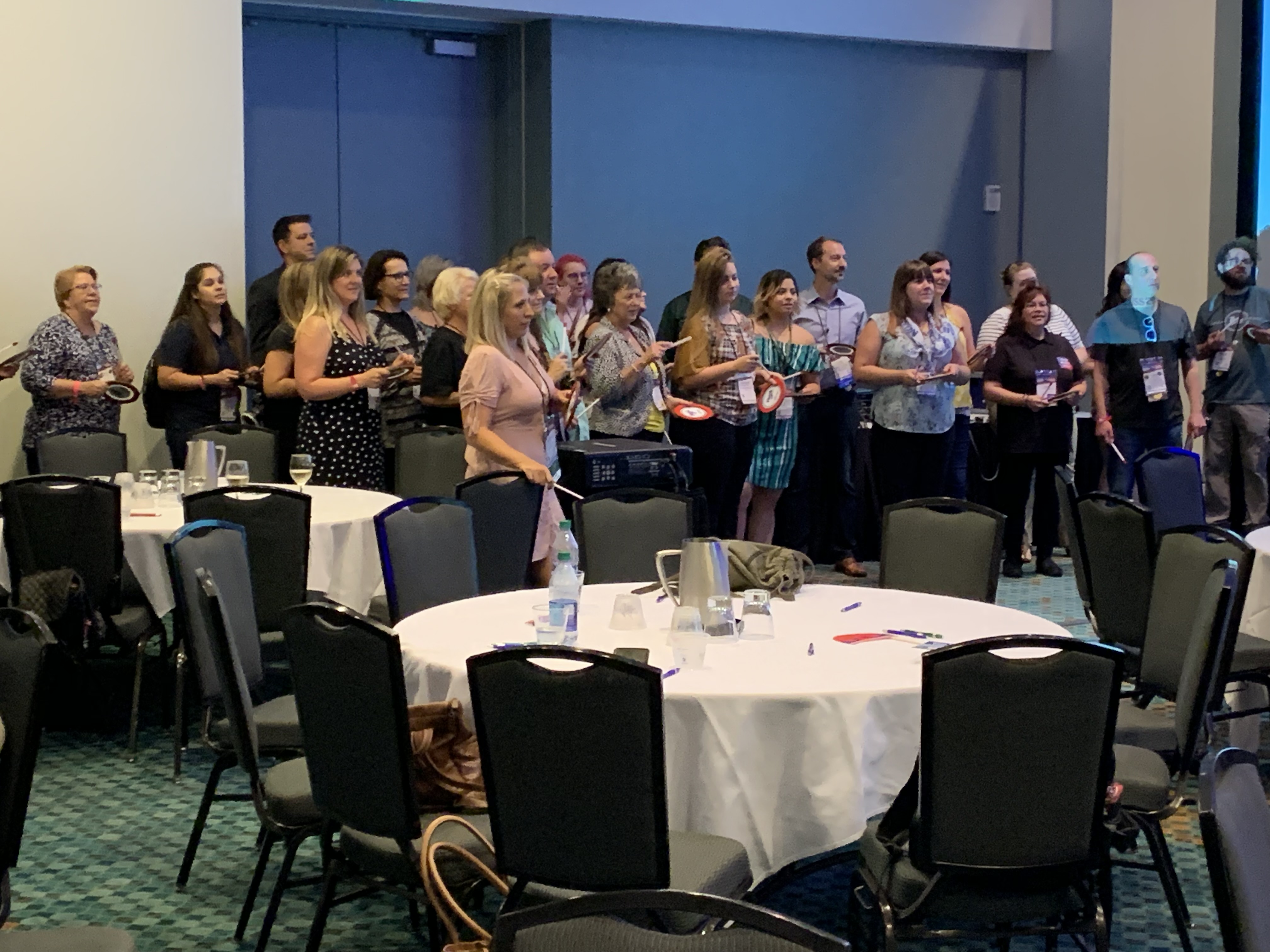
The SWIM Meet featured a drum circle.
Going for a SWIM
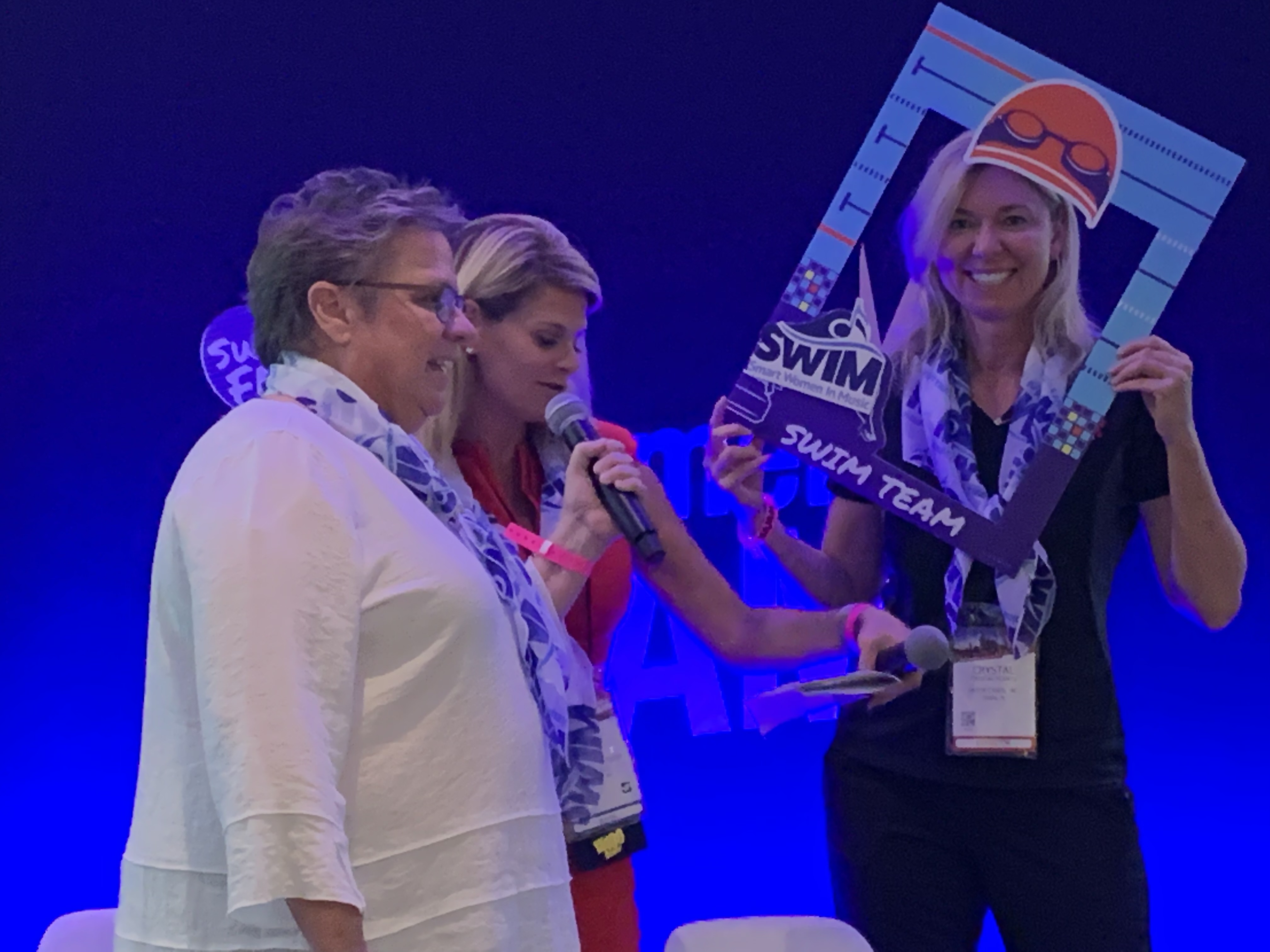
SWIM’s Robin Walenta, DeDe Heid and Crystal Morris.
Definitely another highlight at Summer NAMM was the Smart Women in Music (SWIM) Meet on July 18. SWIM tri-founder DeDe Heid of Heid Music explained that SWIM is needed because “We have an underrepresentation of women in the music products industry. It’s OK to say it. But it’s more important to acknowledge it and do something about it. I couldn’t be more proud of this initiative, and the fact it was kicked off at the time when we were able to celebrate our first chairwoman at NAMM (SWIM tri-founder Robin Walenta of West Music). So, thank you to all of those who helped to leave a legacy to say this will not be the case [of no NAMM chairwomen] for another 119 years. Bravo.”
The event also featured a drum circle, an introduction of the inaugural SWIM scholarship winners and the launch of a 2020 NAMM Show SWIM scholarship program. Applications can be made until Sept. 20, with up to six winners being announced on Halloween. More information can be found at smartwomeninmusic.org. “Let’s get more women to The NAMM Show in January,” said Heid.
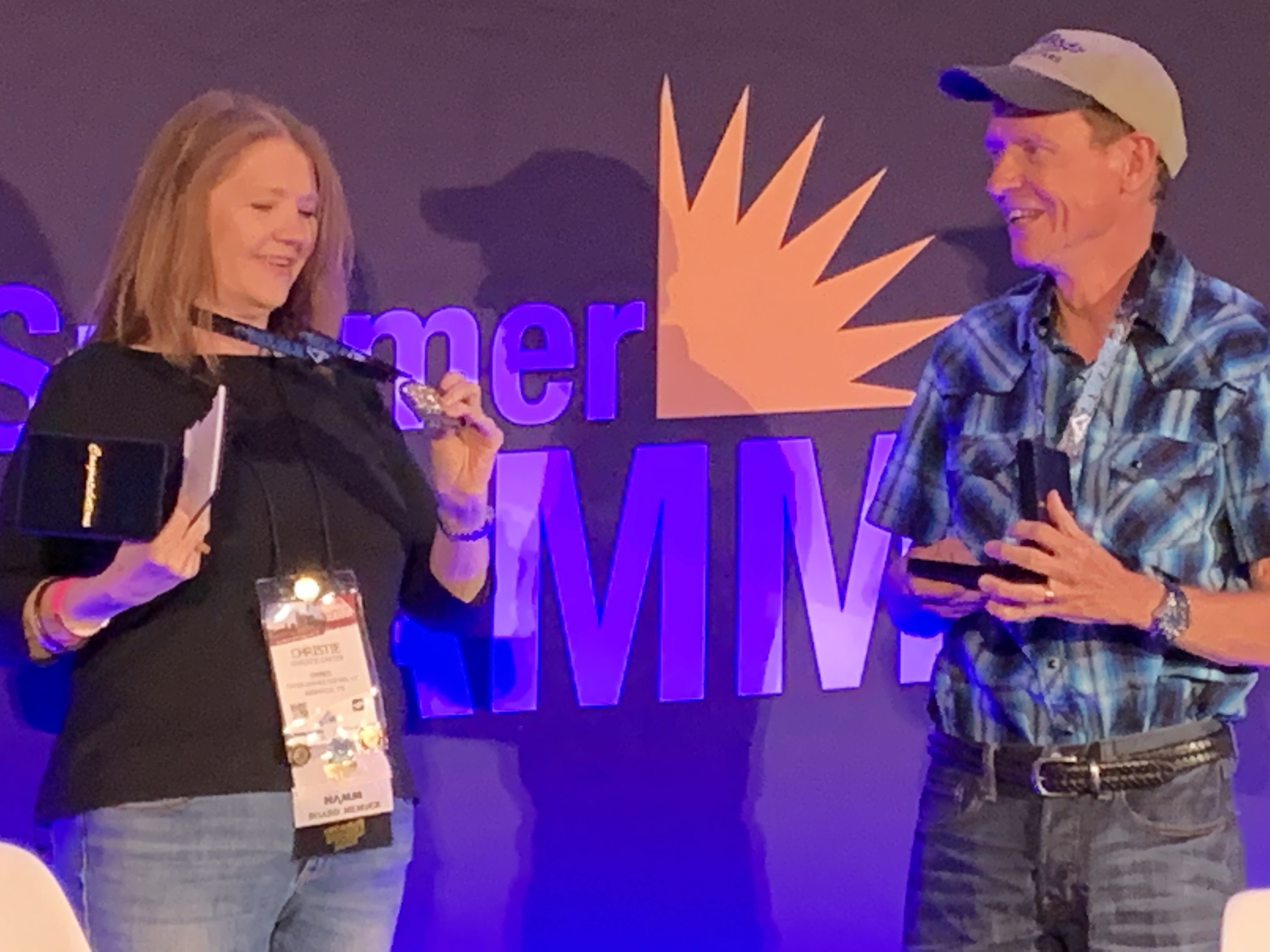
Christie Carter and Chris Martin
SWIM also honored Christie Carter of Carter Vintage Guitars, who pledged $15,000 to the organization, and Diane Martin and her husband Chris Martin of C.F. Martin Guitars, who also donated a considerable amount to the cause.
“It sends a message that there is a place for more women,” said Carter. “I can also tell my daughter, who is a rocket scientist, that I am a ‘Smart Woman.’”
Chris Martin said he was speaking on behalf of his wife Diane, who was at home in Pennsylvania to be a “stay-at-home mom,” taking care of a new puppy the Martins’ recently brought home. He explained that even though Martin Guitar has its own foundation and Chris Martin is also heavily involved in the Collings Foundation, Diane Martin wanted a charitable cause to call her own. “My wife wrote the check,” said Chris Martin. “This is for her.”
Summer NAMM will return to the Music City in 2020 from July 9 to 11.


